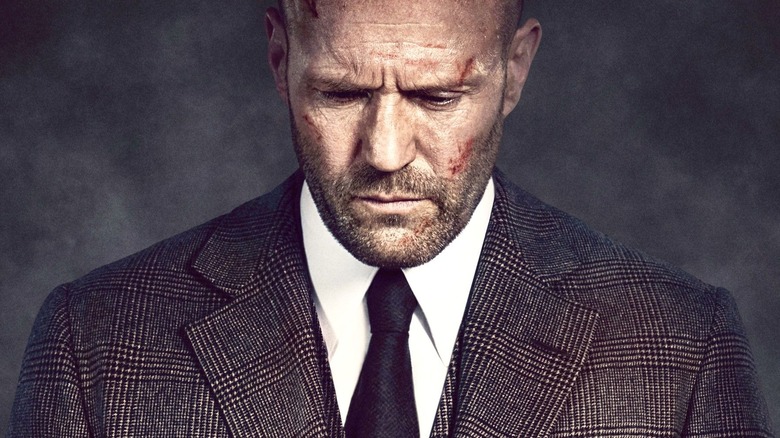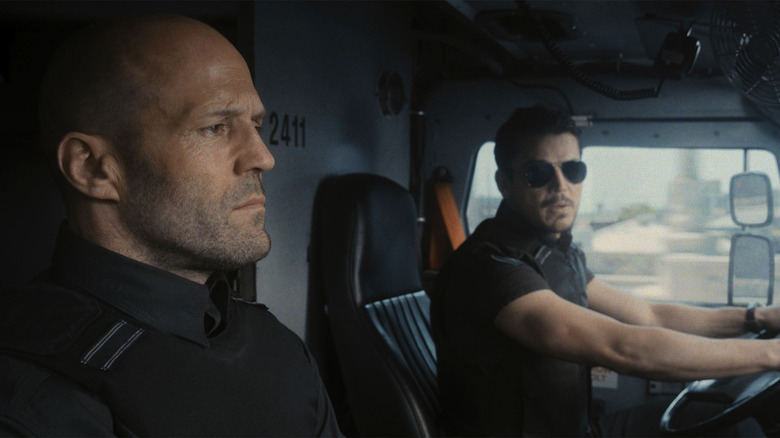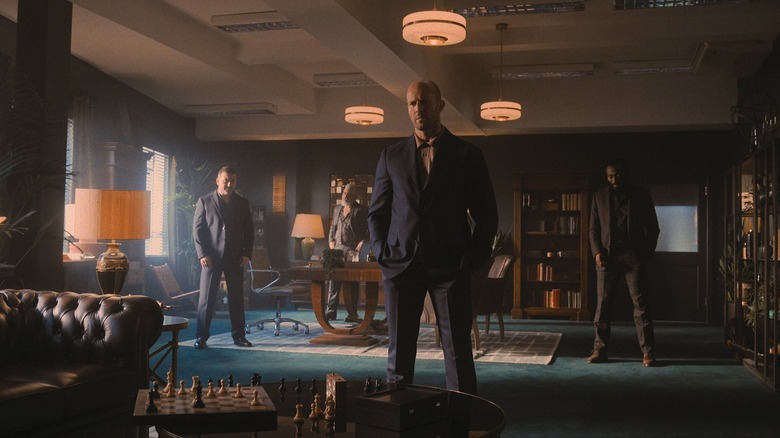Wrath Of Man Review: Ritchie's Got A Brand New Bag
There are two Guy Ritchies. There's the Guy Ritchie studios trust with their big tentpole releases, the one who gave us absolute bangers like "Sherlock Holmes" and "The Man From U.N.C.L.E" but also less effective flicks like "Aladdin" and "King Arthur." He's a fun guy, for sure, but he's decidedly hit or miss. Then there's the Prime Guy Ritchie, the one whose name is practically a genre itself, with his cockney inflected gangster pictures, ensembles teeming with diverse talent and crackling with style. That's our guy. The OG. A reliable classic.
Seeing that "Wrath of Man," his latest, re-teams the auteur with three-time collaborator Jason Statham, perhaps the platonic ideal of the Guy Ritchie leading man, it would make sense to expect that primal energy first harnessed all the way back in "Lock, Stock and Two Smoking Barrels."
But "Wrath of Man" presents a brand new, third Guy Ritchie. He's more somber, but no less subtle. Austere, but no less violent. He's also clearly been rewatching "Heat" lately. We're not yet sure what to make of this new Guy.
Based on the 2004 French film "Cash Truck," "Wrath of Man" stars Statham as "H," a mysterious man hired by Fortico, a Brinks-like cash truck business, that recently lost two drivers in a violent heist gone wrong. The movie presents H as a man his new co-workers wouldn't look twice at, an unassuming bit player keeping his nose to the grindstone and not looking to make friends. But it's Jason Statham. Something is up with that dude. His aptitude testing was decidedly mediocre, sure, but his marksmanship proves to have been purposely muted so as not to draw attention.
Because the minute his truck gets hit, H turns into a cold-blooded killing machine, a man who is clearly not there for this job, but some personal vendetta yet to be unpacked. Whether or not that mystery is sufficiently intriguing or whether his mission of revenge is gripping feels besides the point. You put Jason Statham and a gun in a Guy Ritchie movie and audiences are just going to be waiting for him to fire it. A lot.
"Wrath of Man" delivers the goods in that regard, but everything surrounding it feels at turns too silly and too maudlin, never quite finding the right balance for this sort of flick.
Masculinity is a prison, bro!
Before the shoot-'em-up begins in earnest, "Wrath of Man" spends its first 20 minutes as the most interminable movie imaginable. Statham, for his salt, does a bang-up job playing H as mysterious and hard as necessary, but Ritchie's script, co-penned by "The Gentlemen" co-horts Ivan Atkinson and Marn Davies, is by far the clunkiest and most tone-deaf he's ever served up.
The time spent introducing the rest of the Fortico staff pays off later, but it feels twice as long as the rest of the movie combined. For every genuinely interesting character we meet, from Eddie Marsan's put-upon supervisor to Holt McCallany's trainer, there's someone so grating they make the viewer's skin chafe, like Josh Hartnett's Boy Sweat Dave, an aggressive stereotype who sucks the air out of every scene he's in.
Ritchie and his co-writers stack up tough-talking bro-y one liners like thick Jenga pieces, erecting a rickety tower of testosterone that just takes far too long to topple.
But topple it does once H foils that first attempted heist and it becomes clear they were laying it on so thick to make a statement. Fortico is a company stocked full of pretend hard men, guys who are all bluster and no bang. H isn't that at all. Neither is the mysterious crew of robbers he took this job to find and hunt.
"Wrath of Man" improves considerably once it pushes Foritco into the background and flashes back to show us H's life before this job, who he lost, how he lost them, and how much blood he's already spilled in the search for their killers. Statham is uniquely gifted in that he's equally adept at playing charming rogues in more self-aware action movies as he is doing more monosyllabic and interior work for something meaner and nastier, like this.
From the jump, both Christopher Benstead's portentous score and Statham's coiled intensity make H feel like a dark spirit haunting this middling heist thriller from some other, more sinister gangster movie happening offscreen — one we all would much prefer to be watching, thank you very much.
Luckily, in this second act the film's scope skews in that direction, becoming more prismatic and introducing us to a much more fascinating cast of characters (all played ably by folks like DeObia Oparei, Darrell D'Silva, and Andy Garcia). In this period, it more closely resembles that pure Ritchie who has made a career out of finding new ways to show us smoky back rooms, violent men in suits, and the knotty webs that encircle their conflicting obligations and debts.
Rather than hyperfocus on H and his quest, Ritchie presents a world divided between disparate brands of man. The criminal world is split between serious professionals who operate with a code of conduct, for whom crime is just a business, and sloppy fakes just as likely to get themselves killed as they are to end the lives of others.
This divide is best displayed during the first heist H stops, when a deep-voiced and assertive robber over a walkie talkie turns out to be recording artist Post Malone, whose boyishness isn't so much hidden by his vulgarity and face tattoos, but is in fact amplified by them.
Similarly, the "good guys" follow a similar dichotomy, between guys like Marsan's exhausted middle manager who just wants to clock in and out without getting shot and people like Boy Sweat Dave who hide their perpetual fear and anxiety behind hollow bravado.
The men that H is after are neither. They're a group of highly trained individuals (led by the always show-stealing Jeffrey Donovan) who exist outside of this cops-and-robbers paradigm, which makes them both harder to pin down and more exciting foes for H to eventually square off against. But even among their ranks, a woefully miscast Scott Eastwood (a man forever doomed to shiver in the cold shade of his father's shadow) shows that greed and insecurity are all it takes to separate the real men from the pretenders.
...but sometimes it's a fun prison.
If it sounds like "Wrath of Man" is a movie that throws too many spinning plates at a pretty straightforward premise, that's because it's a film whose complexity and density are its own worst enemies. For every element of the film that feels fascinating enough to warrant its narrative diversions, like the lengthy set piece detailing Donovan's crew and their history, or H's initial attempts to smoke them out, there are others that just waste time and bog down an already heavy picture, like all the time spent at Fortico waiting to get to the fireworks factory.
But honestly, once we get there and it becomes obvious the last 45 minutes are going to be dedicated to one major heist sequence that will undoubtedly devolve into a veritable smorgasbord of gunfire and brutality, all the quibbles and complaints go out the window. The largely patient and moody camerawork Ritchie has been employing, the steadier more reserved approach to the visuals, all collide together to present a display of violence and carefully orchestrated chaos that is truly a sight to behold.
It would be hyperbole to put "Wrath of Man"'s final set piece into the same conversation as, say, any Michael Mann movie, but there's a dirtbag cowboy aura about it that's easily on par with something like "Den of Thieves" and it's a welcome new element within Ritchie's repertoire. It's not fully honed yet, but seeing this new gear manifest within his usual bag of filmmaking tricks implies that there's ample room to further develop this forked style.
If Ritchie's next film iterates on what works best in "Wrath of Man," its haunting malevolence and its ability to meld real pathos with crowd-pleasing bullet orgies, then it'll be all the easier to forgive this picture's considerable foibles, its overcooked writing and all that dreadful dialogue. "Wrath of Man" is by no means perfect on its own, but its positioning as the work of a veteran director writhing out of the two-fold path he's been on for decades is genuinely exciting.


